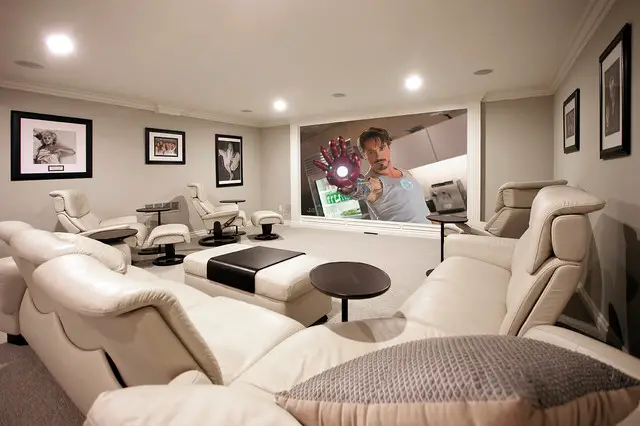Designing Your Home Theater Space
Choosing the Right Room
When creating a home theater, the first step is to select the right room. Ideally, you want a space that is relatively isolated from the rest of the house to minimize distractions and outside noise. Basements, spare rooms, or even a dedicated portion of your living room can work perfectly.
Controlling Lighting
Lighting plays a crucial role in the home theater experience. To achieve the best results, opt for blackout curtains or blinds to keep the room as dark as possible. Consider installing dimmable LED lights around the perimeter of the room to create a subtle and immersive ambiance.
Optimal Seating Arrangement
Comfortable seating is a must for any home theater. Choose plush recliners or even a sectional sofa with built-in recliners for a true cinema-like experience. Arrange the seating in a way that offers clear sightlines to the screen from every angle.
Audiovisual Setup and Calibration
High-Resolution Display
Invest in a high-quality display that suits the size of your room. Large LED TVs or projectors with high resolution and ample brightness are excellent choices. Consider factors like aspect ratio, screen size, and viewing distance to ensure a captivating visual experience.
Surround Sound System
Immersive audio is a hallmark of a great home theater. A surround sound system with multiple speakers strategically placed around the room can replicate the cinematic sound experience. Position a center channel speaker below the screen, front speakers at ear level, and rear speakers behind the seating area.
Acoustic Treatment
To achieve optimal audio performance, consider adding acoustic treatments to your theater room. These treatments can include sound-absorbing panels, bass traps, and diffusers. They help to minimize sound reflections and enhance the clarity of dialogues and effects.
Technical Setup and Connectivity
High-Speed Internet
A seamless streaming experience requires a stable and high-speed internet connection. If possible, opt for a wired connection to ensure minimal latency and buffering. This is crucial for streaming high-definition content without interruptions.
Smart Connectivity
Equip your home theater with smart devices that allow easy control of various components. Smart TVs, streaming devices, and universal remotes can simplify the user experience by enabling you to control everything with a single device.
Cable Management
Keep your setup organized and clutter-free by using cable management solutions. Concealing wires not only improves the aesthetics of your home theater but also prevents tripping hazards and interference.
Fine-Tuning and Enjoyment
Calibration and Testing
After setting up your home theater, it’s essential to calibrate both the audio and visual components. Most systems come with built-in calibration tools, but professional calibration services can provide even better results, ensuring accurate colors, optimal brightness, and balanced audio.
Comfort and Convenience
Enhance your home theater experience with comfort and convenience in mind. Install a mini-fridge to keep snacks and drinks within arm’s reach. Consider adding a popcorn machine for that authentic movie theater feel.
Regular Upgrades
Stay up to date with the latest audiovisual technologies by periodically upgrading your equipment. Newer displays, audio formats, and streaming technologies can significantly enhance your viewing experience.


